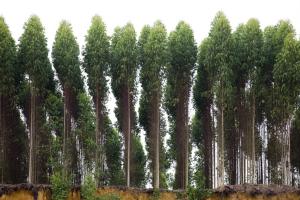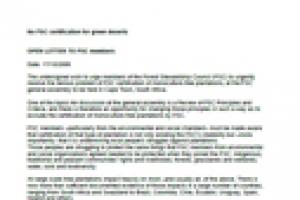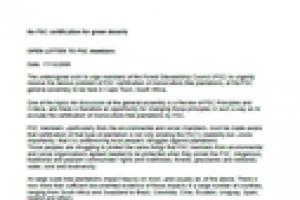The major issue of land tenure underlies the problem of oil palm schemes in Indonesia and elsewhere. Occupying large tracts of community land where food and cash crops used to be grown and medicines and building materials were harvested, monoculture oil palm plantations erode the rights and livelihoods of local communities.
Through promises, bribes, and cheating combined with the unawareness of local communities of their rights, companies move in leading to the large-scale privatisation of land and natural resources.
Large-Scale Tree Plantations
Industrial tree plantations are large-scale, intensively managed, even-aged monocultures, involving vast areas of fertile land under the control of plantation companies. Management of plantations involves the use of huge amounts of water as well as agrochemicals—which harm humans, and plants and animals in the plantations and surrounding areas.
Other information
2 February 2008
Other information
2 February 2008
The pulp and paper company ENCE owns monoculture eucalyptus plantations in Spain and Uruguay, certified by FSC. Part of these plantations, some 12,000 hectares spread out among over 200 plots, are located in the Northeast of Spain (Galicia, Asturias and Cantabria) and are managed by one of its forestry subsidiary companies, NORFOR.
Bulletin articles
2 February 2008
Born to independence in 1960, the Democratic Republic of Congo has lived since then amid fighting. Its former colonial ruler Belgium, as well as the US, the EU and international financial institutions such as the World Bank have been key hidden actors and interested parties in a scenario where ethnic rivalry has caught the world attention, while hiding economic struggles over the riches of a country which was the world’s largest cobalt exporter, the fourth biggest diamond exporter and ranked among the top ten world producers of uranium, copper, manganese and tin.
Action alerts
16 January 2008
Only available Spanish and Portuguese.
Comunicado de Prensa de RECOMA
16 de enero de 2008.
Action alerts
15 January 2008
Only available in Spanish -
15 de enero de 2008
Exmo. Sr. Luíz Inácio Lula da Silva
Presidente da República Federativa do Brasil
Exma. Sra. Marina Silva
Ministra de Meio Ambiente (MMA)
Action alerts
15 January 2008
Only available in Spanish -
15 de enero de 2008
Señora Michelle Bachelet
Presidenta de La República
Palacio de La Moneda
Santiago, Chile
Bulletin articles
3 January 2008
Since 2003, New Zealand's Scion has been carrying out a field trial planting of genetically engineered (GE) Radiata pine and Norway spruce trees at its research facilities in Rotorua. The GE trees contain reporter genes, herbicide resistance genes and genes which according to Scion are "thought to affect floral development". The trial is planned to last 22 years, although none of the trees will be left in the ground for more than 10 years.
Bulletin articles
3 January 2008
The main threat to the world's forests is not that they will all be cut in the coming decades. There is an even larger threat; that the last tracks of rich, beautiful, vibrant biologically diverse primary forests that still exist on this planet will all be replaced by ugly, biodiversity-poor and empty rows of monoculture tree plantations.
Bulletin articles
3 January 2008
In Latin America biotechnology applied to research on varieties of transgenic trees to give them certain characteristics facilitating their large-scale monoculture plantation is being led by two countries: Brazil and Chile.
In Brazil, the National Biosecurity Technical Commission (CTNBio), the body responsible for monitoring recombining DNA technology – implying gene manipulation –approved standards for planned liberation into the environment of experiments with transgenic eucalyptus trees in the country in June 2007.
Bulletin articles
3 January 2008
The Sixth Meeting of the Pesticide Action Network (PAN) took place in Penang, Malaysia from 28 November to 3 December 2007. The 25th Anniversary of the foundation of this Network was celebrated in the same city that saw it come into being: Penang.
PAN is a network involving over 600 non-governmental organizations, institutions and individuals, who work in over 90 countries to replace the use of dangerous pesticides by ecologically and socially just alternatives.
Other information
3 January 2008
Indonesia, a leading producer of palm oil, reached an output of 16 million tonnes in 2006, having tripled the area of land under oil palm plantation between 1995 and 2005.
Other information
3 January 2008
The United States is legendary for our ability to consume. Though we have the third largest population in the world far behind China and India, we consume more than any other nation in the world. This is no different when it comes to paper; we leave the rest of the world behind with the average American consuming 300 kg of paper per year. For context, the United Nations estimates that 30-40 kilos is the minimum needed to meet basic literacy and communication needs.



